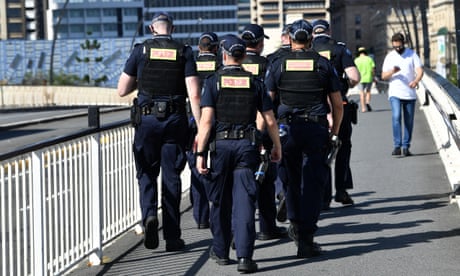- by foxnews
- 08 Apr 2025
‘Placate her anger’: investigation dismisses allegations of domestic violence against Queensland police officer
‘Placate her anger’: investigation dismisses allegations of domestic violence against Queensland police officer
- by theguardian
- 05 Jul 2022
- in news

A Queensland police whistleblower said the police chose not to pursue credible domestic violence allegations against a serving officer, after dismissing his wife as having "mental health issues" and needing to be "calmed down".
The whistleblower, a former senior sergeant, has made an unpublished submission to a Queensland inquiry into police culture and the handling of domestic violence cases.
In the statement, the former officer details how, in late 2020, she was requested by a superintendent to contact the wife of a serving officer to "placate her anger", and that the woman was "making noise" regarding her complaint of domestic violence against her husband.
"I was advised by the superintendent she has 'mental health issues' and needed to be 'calmed down'," the former officer said in her submission.
"After reviewing the information on the QPS database I returned to the superintendent and advised him I had concerns about the investigation as behaviours consistent with officer-involved domestic violence were present.
"I provided brief written documentation of how each action/behaviour outlined in the reports constituted DFV.
"A week later I was advised the investigating officer had been contacted and my assistance was no longer required."
The submission said a police internal investigation ultimately ruled there was insufficient evidence for a domestic violence protection order to be made against the officer. A court ultimately granted such an order against the man after his wife obtained legal advice and made a private application.
The former senior sergeant detailed how colleagues rallied around the accused man while under investigation.
"Within that male-dominated office he was provided constant support and understanding.
"As a victim survivor of officer-involved domestic violence by my former husband, I found the experience distressing and disappointing."
Last May, the assistant police commissioner, Brian Codd, told Guardian Australia that police were "grappling" with how to respond to the increase in officer-involved domestic violence, and that reforms were "very much" on the agenda.
But the service appears to have balked at any substantial reform.
Victoria has attempted to address the issue by establishing a specialist police unit to investigate complaints against officers.
Guardian Australia reported in 2020 that 84 serving police officers had been accused of domestic violence in the previous five years. Police said this rate is "lower than the general public" but evidence suggests officers are "as likely as anyone else" to perpetrate domestic violence.
The commission of inquiry into police culture has also received a claim that an officer was directed to withhold evidence of police failures in domestic violence cases from the state coroner's office, and that detectives did not properly investigate the deaths of at least four First Nations women who had previously been subject to repeated violence by their partners.
Other submissions from current and former officers have detailed references to an area where female detectives sit as "cunt corner" and a male officer asking: "is this a real rape or is she looking for a free pap smear?"
A QPS spokesperson said the force is committed to supporting victims of domestic and family violence and holding perpetrators to account, but as the submissions were being made directly to the inquiry they could not comment on specific matters.
"While the service has already made significant changes to strategies, policies, processes, training and technology, the commission of inquiry [COI] is an opportunity for the organisation to improve and strengthen our DFV response across the organisation," the spokesperson said.
"The QPS understands the COI will receive various submissions detailing experiences with officers and we welcome the opportunity to learn and improve from these contributions wherever we can.
"We are encouraging and supporting current and former QPS officers in contributing to the COI."
- by foxnews
- descember 09, 2016
Ancient settlement reveals remains of 1,800-year-old dog, baffling experts: 'Preserved quite well'
Archaeologists have recently unearthed the remarkably well-preserved remains of a dog from ancient Rome, shedding light on the widespread practice of ritual sacrifice in antiquity.
read more


